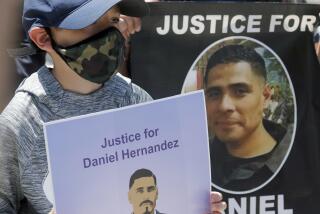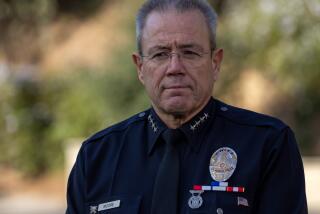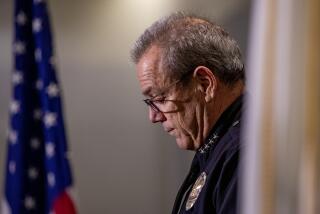LAPD officer cleared in shooting of day laborer
A Los Angeles police officer was justified when he fatally shot a Guatemalan day laborer armed with a knife in an encounter last year that triggered days of unrest, the LAPD’s oversight body decided Tuesday.
Authorities, concerned that the Police Commission’s decision would spark another round of violent protests in the Westlake district, dispatched a large contingent of officers to the area. By Tuesday evening, however, only a small group of protesters had gathered.
In making the announcement at a tense news conference attended by diplomats from several Central American countries, Commission President John Mack went out of his way to call the shooting a “particularly sad incident for all involved” and said “the loss of any life is tragic.”
But, in a clear effort to preempt claims by police critics of a whitewash, Mack said the Los Angeles Police Department’s investigation into the shooting, and the commission’s review of the inquiry, had been “comprehensive” and “exhaustive.”
The unanimous ruling by the five-member panel, along with the decision Tuesday by the Los Angeles County district attorney’s office not to file any criminal charges in the case, fully exonerated Officer Frank Hernandez, a 14-year veteran of the department, of any wrongdoing. In clearing Hernandez, the commission went along with the recommendation of LAPD Chief Charlie Beck that the shooting be judged to have been within department policies.
Luis Carillo, an attorney representing the dead man’s wife in a federal civil lawsuit against the city, denounced the commissioners’ decision. “The script had already been written.... They just followed it,” he said.
The shooting occurred on a Sunday afternoon in September, when Hernandez, who was assigned to a bicycle unit in the LAPD’s Rampart Division, responded with two other officers to a report of a disturbance in the densely-populated, Latino-immigrant neighborhood.
At 6th Street and Union Avenue, the officers found 37-year-old Manuel Jamines, who was drunk and holding a knife, according to an account of the incident given by Mack. The officers, Mack said, repeatedly ordered Jamines in Spanish and English to drop the weapon. Jamines instead raised the knife and charged at Hernandez, who fired two shots, Mack said. Jamines was struck in the head and died on the street in front of a crowd.
Mack emphasized the commission did not rely exclusively on Hernandez’s account of the shooting. Testing on the knife recovered at the scene found Jamines’ DNA and several eyewitnesses backed the officer’s account, Mack said. Mack acknowledged that investigators had spoken to a few witnesses who said they had not seen a knife in Jamines’ hand, but he said those witnesses did not have a clear view of the encounter.
The shooting triggered a few days of protests and some rioting in the neighborhood. The unexpected anger came to be seen by many onlookers as an expression of broader frustrations in the poor, immigrant neighborhood. Many protesters questioned why the officers hadn’t used a non-lethal weapon to subdue Jamines or shot him with the intent to wound him.
Beck, speaking to reporters Tuesday afternoon alongside Mayor Antonio Villaraigosa, said the officers had not been equipped with Tasers or other non-lethal weapons. He added that LAPD officers are forbidden from aiming their guns to wound suspects because of the potential for missing and hitting a bystander.
“Officers have an obligation to protect people and protect themselves,” Beck said. “They don’t get to tie and they certainly don’t get to lose.”
That rationale was met with disappointment by some immigrant-rights groups.
“The Police Commission ruling … leaves us bereft, disappointed, and with more unanswered questions,” said Angelica Salas, executive director for the Coalition for Humane Immigrant Rights of Los Angeles. “It is no small matter to use a weapon that can take a man’s life and not have to face serious consequences for those actions.”
More to Read
Start your day right
Sign up for Essential California for news, features and recommendations from the L.A. Times and beyond in your inbox six days a week.
You may occasionally receive promotional content from the Los Angeles Times.






